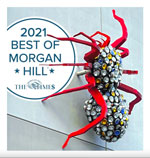
As lawsuits are piling up against the makers of the herbicide Roundup and some cities and counties in California are banning its use, the City of Morgan Hill continues to use a generic version on a limited basis in city parks.
Public Services Director Chris Ghione, in response to questions from the Times, said he is confident that the city uses the herbicide sparingly and in a safe manner in accordance with strict government safety standards.
“The city is changing its approach to pesticide use on an ongoing basis to ensure safety,” he said.
Ghione said Morgan Hill recently started a pilot program at one park site, “eliminating the use of herbicides completely.”
“This park is a trial site to assess the possibility and costs related to eliminating the use of herbicides in the future,” he said. The trial is in its second year at Paradise Park on LaCrosse Drive.
At other locations, the city applies Ranger Pro herbicide, which contains the controversial chemical glyphosate, in city parks, rights-of-way and utility stations twice a year, but never in or near waterways. The state of California and the World Health Organization have listed glyphosate among chemicals that are “possibly carcinogenic.”
Morgan Hill also is in the process of reviewing and will begin testing alternate pesticides that do not contain glyphosate for effectiveness, said Ghione.
The city for six years has posted notices of herbicide use 72 hours in advance of any application, and the signs stay in place at least 24 hours after pesticide applications, Ghione said, adding, “The city follows all federal, state and Santa Clara County guidelines and regulations and city staff utilize all personal protective equipment and follow all procedures outlined for each pesticide.”
Morgan Hill has two permits for pesticide application registered with the Santa Clara County Department of Agriculture, said Ghione.
“We follow all label instructions, post notifications in parks prior to application, leave the notifications in place for a minimum of 24 hours after completing the application (meeting school requirements and going beyond requirements for parks), and document all chemical mixtures and usage as required by federal, state and local laws, as well as following the City of Morgan Hill Integrated Pest Management System,” Ghione said in a statement.
All crews that apply pesticides in Morgan Hill are overseen by a maintenance worker on site with a valid California Pesticide Qualified Applicators Certificate, and all pesticide mixing is performed by a crew member properly trained and in possession of a valid certificate, he said.
He said the city also uses Dimension Ultra (dithiopyr), Milestone (triisopranolammonium salt), Capstone (aminopyralid; Triclopyr) and Clearcast (ammonium salt of imazamox 2) herbicides on some city-owned property.
Use of Roundup and other glyphosate products has become increasingly controversial, especially in California. In the wake of a second successful lawsuit against Bayer, owner of Roundup-maker Monsanto, last month the city of Napa and Los Angeles County banned use of Roundup and its active herbicide, glyphosate. On the Central Coast, the San Lorenzo Valley Water District last month banned use of glyphosate by its staff on its large mountain watershed.
Use of the herbicide is widespread by CalTrans, school districts and cities, and it’s readily available in hardware and garden retail stores in California, despite the state’s 2017 determination that the herbicide can cause cancer. California continues to license and approve its use under strict guidelines. California was the first state in the US to list glyphosate as a carcinogen.
Proposition 65, approved by California voters in 1986, requires the state to publish a list of chemicals known to cause cancer, birth defects or other reproductive harm.
Glyphosate is the world’s most widely used weed killer. Monsanto’s Roundup was the first glyphosate-based weed killer but is no longer patent-protected, and many other versions are now sold.
The US Environmental Protection Agency, the European Chemicals Agency and other regulators have found that glyphosate is not likely carcinogenic to humans. But the World Health Organization’s cancer arm in 2015 reached a different conclusion, classifying glyphosate as “probably carcinogenic to humans.”
The most recent case was only the second of some 11,200 Roundup lawsuits to go to trial in the US.
The city keeps some public records of all herbicide and pesticide use, as required by the state.







